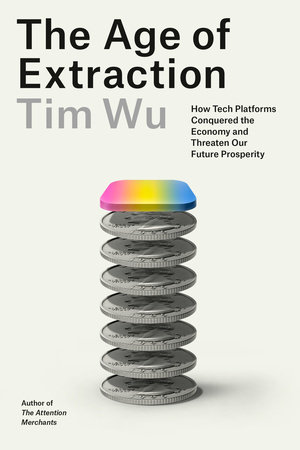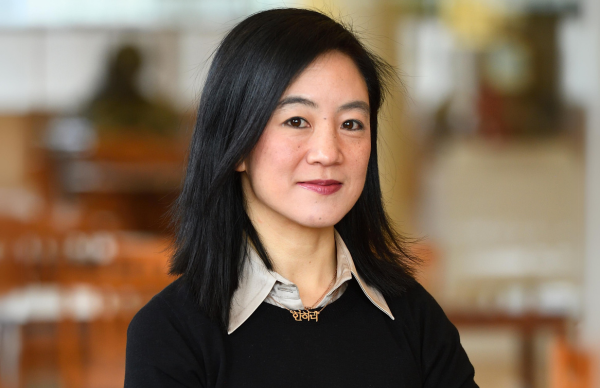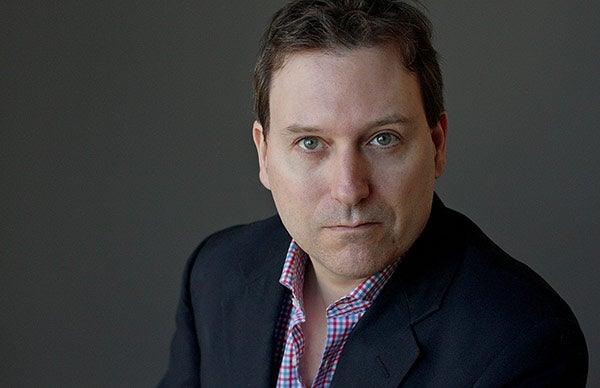Tim Wu
Former White House Antitrust Advisor, Columbia Law School Professor, and author of The Age of Extraction and The Attention Merchants
Photo Credit: Miranda Sita
-
About Tim Wu
Tim Wu has long been one of the most influential thought leaders on the tech industry and the future of America’s information economy. During his time in the Biden administration, Wu shaped technology-focused antitrust legislation and was the architect of President Biden’s 2021 executive order on the promotion of competition throughout the US economy.
Wu’s riveting talks on topics such as the perils and promise of generative AI and machine learning, the rise and fall of information empires, antitrust regulation, and consumer consumption habits, appeal to tech experts, business executives, and consumers alike. Wu’s unusual experience in industry and government, coupled with his deep historical work on the impact of technological advancements on our lives and work, help his audiences understand how we got here, what’s coming next, and, perhaps most important, how to adapt.
His book The Master Switch: The Rise and Fall of Information Empires, published in 2010, was on “Best of” lists in The New Yorker and Fortune magazine and predicted the rise of “Big Tech.” In The Attention Merchants: The Epic Scramble to Get Inside Our Heads (2016), he anticipated the power of attention capture in the pre-Trump era, and the book remains the essential depiction of the attention economy. In his most recent book, The Curse of Bigness: Antitrust in the New Gilded Age (2018), Wu warned about the dangers of corporate and industrial concentration for economic and political future.
Currently the Julius Silver Professor of Law, Science, and Technology at Columbia Law School, Wu is the recipient of numerous awards, including being named one of 50 leaders in science and technology by Scientific American magazine, one of America’s most influential lawyers, and one of Harvard’s one hundred most influential graduates. Wu was a regular contributing opinion writer for The New York Times and a contributing writer for The New Yorker.
Prior to his time in the Biden administration, Wu held numerous public service posts. He was enforcement counsel at the New York Attorney General’s Office, worked on competition policy for the National Economic Council during the Obama administration, and worked for the Federal Trade Commission on antitrust enforcement. In private industry, he worked for Riverstone Networks, was a fellow at Google, and advised Spotify in its early years in the United States. Wu graduated from McGill University (B.Sc.), and Harvard Law School.
-
Speaking Topics
Platform Power: Its Origins and Future
The artificially intelligent platform has grown to become an important and dominant business form for much of the U.S. and world economy. But where did platform power come from and what is its future? In this talk, Tim Wu tells the story of the Internet from the 1990s through today, and the surprising change from a platform expected to broadly spread wealth and democracy around the world to one that has concentrated power in a small number of companies with strong extractive abilities. Along the way it has much to teach about the working of platform power, both in older and newer forms and how neutrality rules can restore balance to the economy.
Regulating AI: Why We Are Doing Too Much. And Too Little.
Recent advances in generative AI technology have provoked debate over the appropriate regulatory framework. A leading commentator in discussions around AI, Tim Wu presents a view that is different from the regulatory models being proposed in Washington, Brussels, and elsewhere. Wu looks at past innovations—such as nuclear fission or transistor-computing—to show that technologies always develop in very different directions. He argues that regulation needs to focus on concrete problems, such as human impersonation, rather than looking ahead to abstract harms, because overregulation runs the risk of insulating the industry from innovation.
The Future of Advertising
In his book, The Attention Merchants, Tim Wu laid bare how attention was being harvested, commodified, and sold to the highest-bidding advertiser. As the advertising ecosystem grows ever more complex with emerging technologies and new players, what does the future hold? In this fascinating talk, Wu chronicles the history of advertising and ad-supported media and looks at how tools such as artificial intelligence can and will change current business models.
-
Video
-
Praise for Tim Wu
“Tim was well-received by all of his audiences. We’re a small university, and something we care about is intimacy in conversation. I think Tim thrived in this kind of environment; even the walks from one place to another were filled with impassioned conversation. And Tim has, obviously, a great mind and a great set of experiences. [He] seems to know interesting things about nearly any topic of conversation.”
— Randall Croom, Assistant Professor, Stetson UniversityWe loved having Tim as our keynote speaker. His knowledge and ideas are so relevant to our audience!
— CETPAThe audience feedback was great. We had some really great questions after the event and Tim was willing to stand and chat with members of the public, addressing the issues with more nuance which they really appreciated. We’d love to have him back in the future, frankly, because he engaged with people so beautifully.
— Toronto Public LibraryPraise for The MasterSwitch
Wu’s engaging narrative and remarkable historical detail make this a compelling and galvanizing cry for sanity . . . in the information age.
— Publishers Weekly (starred review)A free and open Internet is not a given. Indeed, corporate interests are working feverishly to seize control of it. Drawing on history, Wu shows how this could easily happen and why we are at risk of losing the freedom we now take for granted. A must-read for all Americans who want to remain the ones deciding what they can read, watch, and listen to.
— Arianna HuffingtonAn explosive history that makes it clear how the information business became what it is today. Important reading.
— Chris Anderson, author of The Long Tail and Free, and editor of Wired magazineMy pick for economics book of the year.
— Ezra Klein, The Washington PostUnexpectedly fascinating. . . . A substantial and well-written account of the five major communications industries that have shaped the world as we know it: telephony, radio, movies, television and the Internet. . . . The economy and common sense of The Master Switch . . . makes it valuable to the non-wonk wondering how we got where we are today, and where we might be headed next.
— SalonThought-provoking. . . . An intellectually ambitious history of modern communications.
— The New York Times Book ReviewPraise for The Attention Merchants
Part history and part social wake up call, this book is for everyone.
— Library JournalA startling and sweeping examination of the increasingly ubiquitous commercial effort to capture and commodify our attention…We’ve become the consumers, the producers, and the content. We are selling ourselves to ourselves.
— Tom Vanderbilt, The New RepublicThe question of how to get people to care about something important to you is central to religion, government, commerce, and the arts. For more than a century, America has experimented with buying and selling this attention, and Wu’s history of that experiment is nothing less than a history of the human condition and its discontents.
— Cory Doctorow, author of Boing BoingTelevision entranced the masses. Digital media, more insidiously, mesmerizes each of us individually. In this revelatory book, Tim Wu tells the story of how advertisers and programmers came to seize control of our eyes and minds. The Attention Merchants deserves everyone’s attention.
— Nicholas Carr, author of Utopia Is Creepy and The ShallowsI couldn’t put this fascinating book down. Gripping from page one with its insight, vivid writing, and panoramic sweep, The Attention Merchants is also a book of urgent importance, revealing how our preeminent industries work to fleece our consciousness rather than help us cultivate it.
— Amy Chua, Yale law professor and author of Battle Hymn of the Tiger Mother and The Triple Package -
Books by Tim Wu
-
Media About Tim Wu
Request Fees
and Availability
- 212 572-2013
- Tim Wu travels from New York, NY













